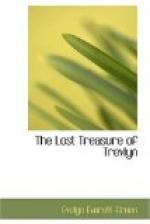“Then canst thou tell me nothing?” he asked.
“I can tell thee much,” was the steady answer, “albeit not all that thou wouldst know; that will still be thine to track out with patience and care. But these lines may help; they may contain a clue. I wonder how and where Esther learned them! But come within the cave. The evening air grows chill, and I and thou have both walked far, and stand in need of refreshment. All is ready for us within. Come; I will lead the way.”
Joanna stepped on before, and Cuthbert followed. He had thought the cave a small and shallow place before, but now he discovered that this shallow cavity in the rock was but the antechamber, as it were, to a larger cavern, where twenty men might sit or lie at ease; and the entrance to this larger place was through a passage so narrow and low that none who did not know the secret would think it possible to traverse it.
Cuthbert wondered if he were letting himself be taken in a trap as he followed the gipsy through this narrow way; but he trusted Joanna with the confidence of instinct which is seldom deceived, and presently felt that they had emerged into some larger and wider place. In a few moments the gipsy had produced a light, and the proportions of the larger cavern became visible. It was a vaulted place that had been hollowed out of the ruddy sandstone either by some freak of nature or by the device of men, and had plainly been adapted by the wandering gipsy tribes as a place of refuge and resort. There were several rude pieces of furniture about—a few pallet beds, some benches, and a table. On this table was now spread the wherewithal for a modest repast—some cold venison, some wheaten bread, a piece of cheese, and a flagon of wine. Cuthbert, who had fared but scantily all that day, was ready enough to obey the gipsy’s hospitable invitation, and seated himself at the board. She helped him liberally to all that was there, but appeared to want nothing herself; and whilst Cuthbert satisfied his hunger she commenced the tale, part of which in its bare outline was already known to him.
“Thou knowest the story of the witch burned on the village common, nigh to Trevlyn Chase, by the order of the knight then ruling in that house? Dost know too that that woman was my grandam, the mother of Miriam and of Esther?”
“I knew that not,” answered Cuthbert.
“But so it was,” pursued Joanna, her big dark eyes fixed upon the flickering flame of the lamp she had kindled. “I never saw my grandam myself; she had met her doom before I saw the light. Yet I have heard the tale so ofttimes told that methinks I see myself the threatening crowd hooting the old woman to her fiery death, the stern knight and his servants watching that the cruel law was carried out, and the gipsy tribe hanging on the outskirts of the wood, yet not daring to adventure themselves into the midst of the infuriated villagers, watching all, and treasuring up the curses and maledictions poured upon the proud head of Sir Richard as the old woman went to her death.”




